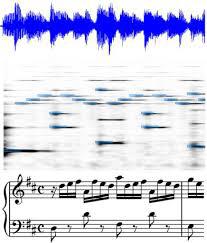Search Results for author: Ju-Chiang Wang
Found 12 papers, 0 papers with code
StemGen: A music generation model that listens
no code implementations • 14 Dec 2023 • Julian D. Parker, Janne Spijkervet, Katerina Kosta, Furkan Yesiler, Boris Kuznetsov, Ju-Chiang Wang, Matt Avent, Jitong Chen, Duc Le
End-to-end generation of musical audio using deep learning techniques has seen an explosion of activity recently.
Scaling Up Music Information Retrieval Training with Semi-Supervised Learning
no code implementations • 2 Oct 2023 • Yun-Ning Hung, Ju-Chiang Wang, Minz Won, Duc Le
To our knowledge, this is the first attempt to study the effects of scaling up both model and training data for a variety of MIR tasks.
Multitrack Music Transcription with a Time-Frequency Perceiver
no code implementations • 19 Jun 2023 • Wei-Tsung Lu, Ju-Chiang Wang, Yun-Ning Hung
Multitrack music transcription aims to transcribe a music audio input into the musical notes of multiple instruments simultaneously.
SingNet: A Real-time Singing Voice Beat and Downbeat Tracking System
no code implementations • 4 Jun 2023 • Mojtaba Heydari, Ju-Chiang Wang, Zhiyao Duan
Singing voice beat and downbeat tracking posses several applications in automatic music production, analysis and manipulation.
Jointist: Simultaneous Improvement of Multi-instrument Transcription and Music Source Separation via Joint Training
no code implementations • 1 Feb 2023 • Kin Wai Cheuk, Keunwoo Choi, Qiuqiang Kong, Bochen Li, Minz Won, Ju-Chiang Wang, Yun-Ning Hung, Dorien Herremans
Jointist consists of an instrument recognition module that conditions the other two modules: a transcription module that outputs instrument-specific piano rolls, and a source separation module that utilizes instrument information and transcription results.
Modeling the Rhythm from Lyrics for Melody Generation of Pop Song
no code implementations • 3 Jan 2023 • Daiyu Zhang, Ju-Chiang Wang, Katerina Kosta, Jordan B. L. Smith, Shicen Zhou
Experiments for Chinese lyric-to-melody generation show that the proposed framework is able to model key characteristics of rhythm and pitch distributions in the dataset, and in a subjective evaluation, the melodies generated by our system were rated as similar to or better than those of a state-of-the-art alternative.
Binaural Rendering of Ambisonic Signals by Neural Networks
no code implementations • 4 Nov 2022 • Yin Zhu, Qiuqiang Kong, Junjie Shi, Shilei Liu, Xuzhou Ye, Ju-Chiang Wang, Junping Zhang
Binaural rendering of ambisonic signals is of broad interest to virtual reality and immersive media.
Jointist: Joint Learning for Multi-instrument Transcription and Its Applications
no code implementations • 22 Jun 2022 • Kin Wai Cheuk, Keunwoo Choi, Qiuqiang Kong, Bochen Li, Minz Won, Amy Hung, Ju-Chiang Wang, Dorien Herremans
However, its novelty necessitates a new perspective on how to evaluate such a model.
 Ranked #1 on
Music Transcription
on Slakh2100
Ranked #1 on
Music Transcription
on Slakh2100
To catch a chorus, verse, intro, or anything else: Analyzing a song with structural functions
no code implementations • 29 May 2022 • Ju-Chiang Wang, Yun-Ning Hung, Jordan B. L. Smith
Conventional music structure analysis algorithms aim to divide a song into segments and to group them with abstract labels (e. g., 'A', 'B', and 'C').
Supervised Metric Learning for Music Structure Features
no code implementations • 18 Oct 2021 • Ju-Chiang Wang, Jordan B. L. Smith, Wei-Tsung Lu, Xuchen Song
Music structure analysis (MSA) methods traditionally search for musically meaningful patterns in audio: homogeneity, repetition, novelty, and segment-length regularity.
Supervised Chorus Detection for Popular Music Using Convolutional Neural Network and Multi-task Learning
no code implementations • 26 Mar 2021 • Ju-Chiang Wang, Jordan B. L. Smith, Jitong Chen, Xuchen Song, Yuxuan Wang
This paper presents a novel supervised approach to detecting the chorus segments in popular music.
Modeling the Compatibility of Stem Tracks to Generate Music Mashups
no code implementations • 26 Mar 2021 • Jiawen Huang, Ju-Chiang Wang, Jordan B. L. Smith, Xuchen Song, Yuxuan Wang
A music mashup combines audio elements from two or more songs to create a new work.




